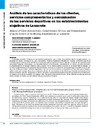Please use this identifier to cite or link to this item:
https://accedacris.ulpgc.es/jspui/handle/10553/71690
| DC Field | Value | Language |
|---|---|---|
| dc.contributor.author | Carreño Clemente, Juan Antonio | en_US |
| dc.contributor.author | Serrano Rodríguez, Alejandro | en_US |
| dc.contributor.author | Medina Muñoz, Diego Ramón | en_US |
| dc.date.accessioned | 2020-04-27T11:46:49Z | - |
| dc.date.available | 2020-04-27T11:46:49Z | - |
| dc.date.issued | 2010 | en_US |
| dc.identifier.issn | 1577-4015 | en_US |
| dc.identifier.other | Dialnet | - |
| dc.identifier.other | WoS | - |
| dc.identifier.uri | https://accedacris.ulpgc.es/handle/10553/71690 | - |
| dc.description.abstract | En términos generales, el deporte es una actividad social positiva para la salud y la calidad de vida de cualquier persona, y es practicado de manera creciente en los viajes vacacionales. Según la Organización Mundial del Turismo, el deporte como sector económico aporta en torno al 2% del PIB de los principales países emisores de turistas. Además, se trata de una actividad estable que permite compensar el dinamismo y los frecuentes cambios en las demandas y necesidades de los turistas, que están afectando a la competitividad de los destinos turísticos como Lanzarote. En los establecimientos alojativos de un destino turístico maduro, los servicios complementarios de los productos más demandados, así como las acciones de comunicación que se realizan sobre las mismas a los clientes potenciales, son áreas importantes a analizar a la hora de realizar un diagnóstico acertado sobre que estrategias a aplicar son las más acertadas. Para ello, se analizaron, además, las características de los clientes que demandan servicios deportivos durante su estancia en la isla. En general, se observa una pobre comunicación del producto deportivo por parte de los establecimientos alojativos de la isla de Lanzarote. En cualquier caso, esto parece consecuencia del poco uso de estas instalaciones por parte del número limitado de turistas que aún visitan la isla para la práctica de deporte | en_US |
| dc.description.abstract | In general terms, sport is a positive social activity for people's health and wellness and is growing during holidays trips. According to the World Tourism Organization (WTO), sport contribute as economic sector to the 2% of the gross product from the main issuing countries. Furthermore, it is a stable activity that allows to compensate the frequent changes in the demand and tourist's needs that are affecting the competitiveness of tourist destinations like Lanzarote. In the tourist accommodation establishments of a mature destination, the additional services from the most demanded products, as well as the communication actions made for the potential guests, are important issues to analyse when making a diagnosis about the right strategies to apply. The features of the clients that demand sport facilities during their stay in the island were analysed. In general, a poor communication of the sport product in the tourist accommodations were noticed. However, it could be a consequence of the low demand for sport facilities taking into account the short number of tourists that visit the island to practise sport. | en_US |
| dc.language | spa | en_US |
| dc.relation.ispartof | Apunts. Educacion Fisica y Deportes | en_US |
| dc.source | Apunts. Educación Fisica y Deportes [ISSN 1577-4015], n. 99, p. 82-91 (2010) | en_US |
| dc.subject | 531290 Economía sectorial: turismo | en_US |
| dc.subject.other | Actividades deportivas | en_US |
| dc.subject.other | Clientes | en_US |
| dc.subject.other | Servicios complementarios | en_US |
| dc.subject.other | Marketing | en_US |
| dc.subject.other | Complementary Services | en_US |
| dc.subject.other | Sport Activities | en_US |
| dc.subject.other | Customer | en_US |
| dc.subject.other | Tourism | en_US |
| dc.title | Análisis de las características de los clientes, servicios complementarios y comunicación de los servicios deportivos en los establecimientos alojativos de Lanzarote | en_US |
| dc.title.alternative | Analysis of client characteristics, complementary services and communication of sports services in the Housing Establishments of lanzarote | en_US |
| dc.type | info:eu-repo/semantics/Article | en_US |
| dc.type | Article | en_US |
| dc.identifier.isi | 000219689900011 | - |
| dc.identifier.url | http://dialnet.unirioja.es/servlet/articulo?codigo=3192491 | - |
| dc.identifier.eissn | 2014-0983 | - |
| dc.description.lastpage | 91 | en_US |
| dc.identifier.issue | 99 | - |
| dc.description.firstpage | 82 | en_US |
| dc.investigacion | Ciencias Sociales y Jurídicas | en_US |
| dc.type2 | Artículo | en_US |
| dc.contributor.daisngid | 32232300 | - |
| dc.contributor.daisngid | 6474544 | - |
| dc.contributor.daisngid | 34941317 | - |
| dc.contributor.authordialnetid | 621225 | - |
| dc.contributor.authordialnetid | No ID | - |
| dc.contributor.authordialnetid | 568461 | - |
| dc.identifier.dialnet | 3192491ARTREV | - |
| dc.description.numberofpages | 10 | en_US |
| dc.utils.revision | Sí | en_US |
| dc.contributor.wosstandard | WOS:Clemente, JAC | - |
| dc.contributor.wosstandard | WOS:Rodriguez, AS | - |
| dc.contributor.wosstandard | WOS:Munoz, DRM | - |
| dc.date.coverdate | 2010 | en_US |
| dc.identifier.ulpgc | Sí | es |
| dc.description.sellofecyt | Sello FECYT | |
| dc.description.esci | ESCI | |
| dc.description.erihplus | ERIH PLUS | |
| item.grantfulltext | open | - |
| item.fulltext | Con texto completo | - |
| crisitem.author.dept | GIR IUCES: Centro de Innovación para la Empresa, el Turismo, la Internacionalización y la Sostenibilidad | - |
| crisitem.author.dept | IU de Cibernética, Empresa y Sociedad | - |
| crisitem.author.dept | Departamento de Economía y Dirección de Empresas | - |
| crisitem.author.orcid | 0000-0002-0370-2353 | - |
| crisitem.author.parentorg | IU de Cibernética, Empresa y Sociedad | - |
| crisitem.author.fullName | Medina Muñoz, Diego Ramón | - |
| Appears in Collections: | Artículos | |
Page view(s)
83
checked on Jan 11, 2026
Download(s)
60
checked on Jan 11, 2026
Google ScholarTM
Check
Share
Export metadata
Items in accedaCRIS are protected by copyright, with all rights reserved, unless otherwise indicated.
